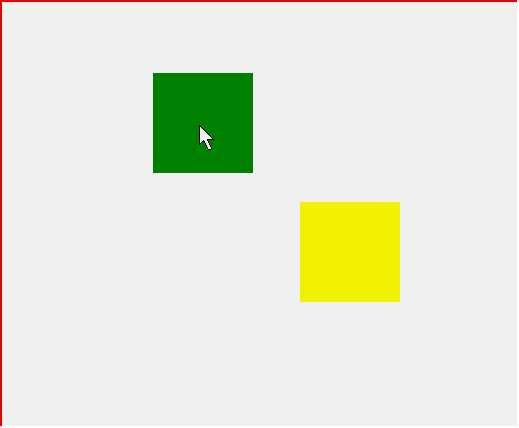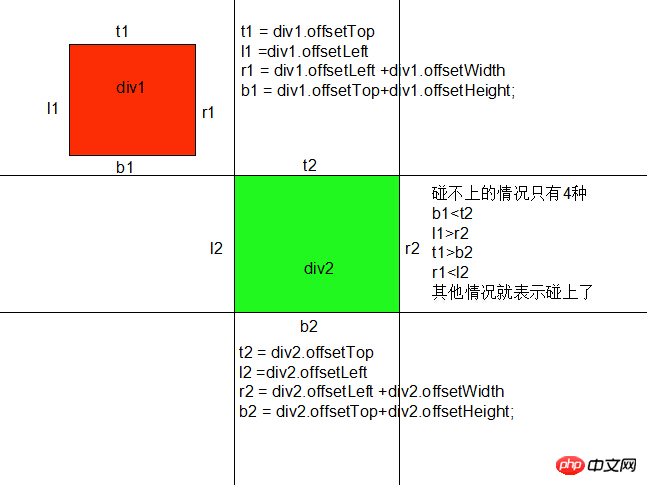
This article mainly introduces the method of realizing collision detection in JS, and analyzes the principles and related operation techniques of javascript collision detection in the form of examples. Friends who need it can refer to it. I hope it can help everyone.
The example in this article describes how to implement collision detection in JS. Share it with everyone for your reference, the details are as follows:
A simple collision detection example, detect whether p1 collides with p2, when p1 hits p2, change the color of p2, see the test picture

Look at the analysis chart:

When p1 moves in the area above the upper edge of p2 (t2), it is always untouchable Up
When p1 moves in the area to the right of p2's right line (r2), it can never touch it
When p1 moves in the area below p2's lower line (b2), it can never touch it
When p1 moves in the area to the left of p2's left line (r2), it will never touch.
Except for the above four situations, other situations indicate that p1 and p2 have touched. Let's try the complete test code
HTML part:
<p id="p1"></p> <p id="p2"></p>
css part:
<style>
#p1{
width:100px ;height: 100px;background: green;
position: absolute;
}
#p2{
width:100px ;height: 100px;background: yellow;
position: absolute;left: 300px;top: 200px;z-index: -1;
}
</style>JS part:
<script>
window.onload = function () {
var op = document.getElementById('p1');
var op2 = document.getElementById('p2');
var disX = 0;
var disY = 0;
op.onmousedown = function (ev) {
var ev = ev|| window.event;
disX = ev.clientX - op.offsetLeft;
disY = ev.clientY - op.offsetTop;
document.onmousemove = function (ev) {
var ev = ev|| window.event;
var t1 = op.offsetTop;
var l1 = op.offsetLeft;
var r1 = op.offsetLeft + op.offsetWidth;
var b1 = op.offsetTop + op.offsetHeight;
var t2 = op2.offsetTop;
var l2 = op2.offsetLeft;
var r2 = op2.offsetLeft + op2.offsetWidth;
var b2 = op2.offsetTop + op2.offsetHeight;
if(b1<t2 || l1>r2 || t1>b2 || r1<l2){// 表示没碰上
}else{
op2.style.background = 'blue';
}
op.style.left = ev.clientX - disX +'px';
op.style.top = ev.clientY - disY +'px';
}
document.onmouseup = function () {
document.onmousemove = null;
document.onmouseup = null;
}
return false;
}
}
</script>Related recommendations:
JS implementation of simple floating collision effect example sharing
Detailed example of JS implementation of small The elastic collision effect of the ball
javascript production game development collision detection encapsulation code_javascript skills
The above is the detailed content of Detailed explanation of collision detection examples using JS. For more information, please follow other related articles on the PHP Chinese website!




